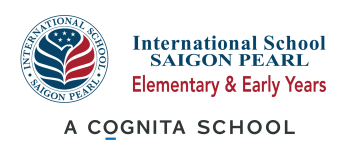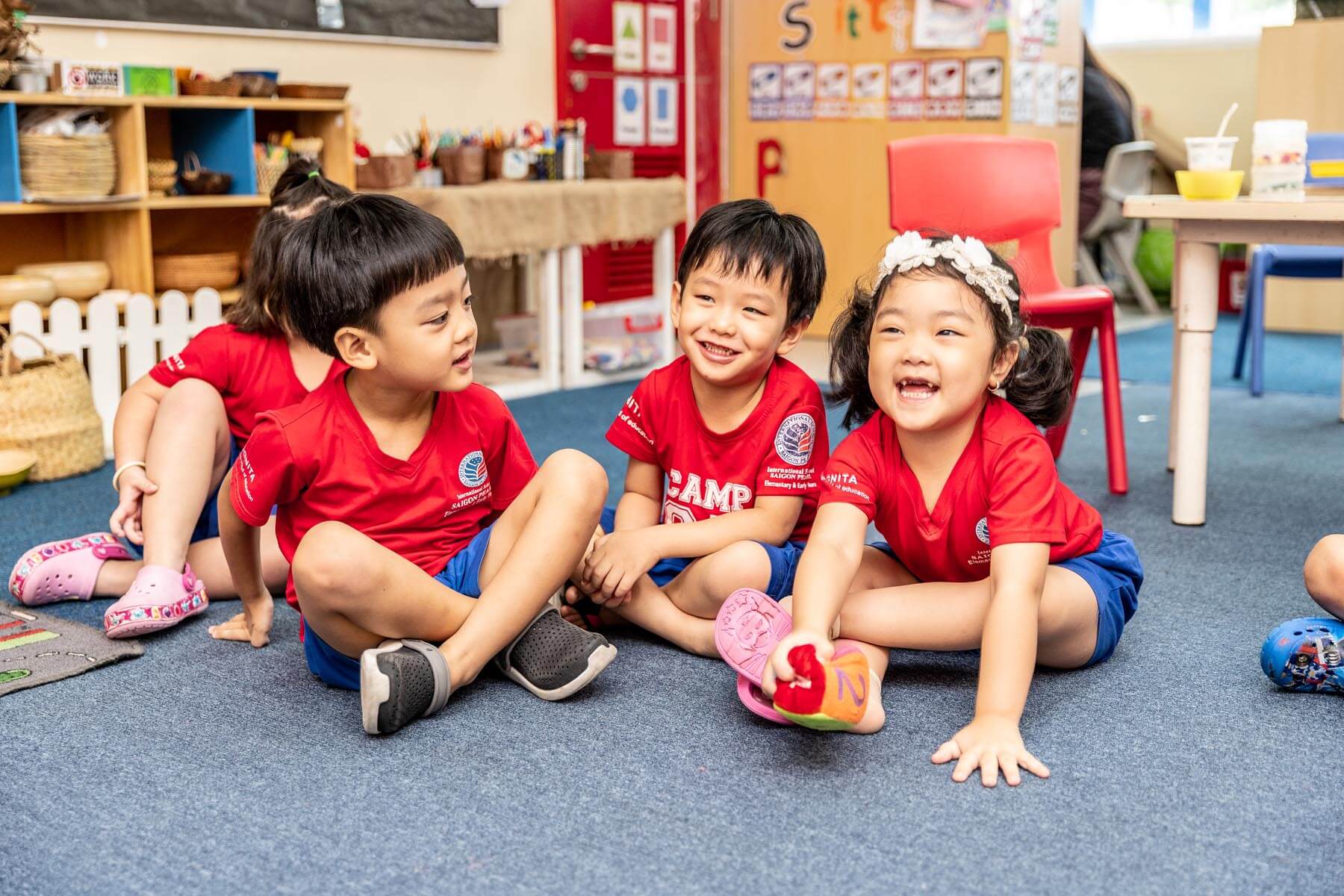Play-based learning is a fun and effective way for kids to develop and knowledge. Children engage in activities that are designed to be both enjoyable and educational. Children can develop their creativity, problem-solving abilities, and social skills through play-based learning. It is a great way to help children learn and grow while having fun and enjoying themselves. Parents and ISSP learn more about this topic through the article below.
Contents
In addition, parents and students should quickly schedule an appointment to visit International School Saigon Pearl to have the opportunity to experience the learning environment here:
What is play-based learning?
Play-based learning is an approach to education that emphasizes the importance of play in a child’s development. It involves using play as a tool for learning rather than relying solely on traditional teaching methods. Play-based learning can take many forms, including games, puzzles, role-playing, and other activities that encourage children to explore, experiment, and discover new things. Its aim to help children develop a range of skills, including social, emotional, cognitive, and physical skills, in a fun and engaging way. It is often used in early childhood education but can be applied to all ages.
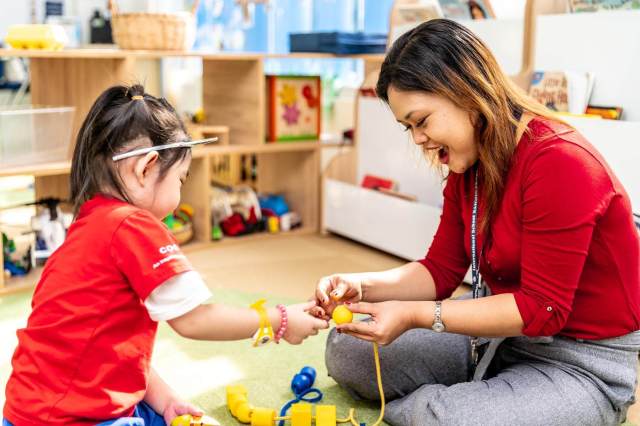
Why is play-based learning important for children?
Children can develop language
Child-centered play-based learning is an approach that motivates children to learn through play and exploration. This learning approach offers various meaningful and purposeful activities that facilitate language development, including storytelling, role-playing, and singing. By engaging in play-based learning, children can broaden their vocabulary, refine their communication skills, and enhance their grasp of grammar and syntax. Additionally, this method promotes social interaction, which is crucial for language development. Play-based learning effectively nurtures children’s language development, while simultaneously promoting their overall growth and development.
>>> Read more: How international schools teach children about compassion and social responsibility
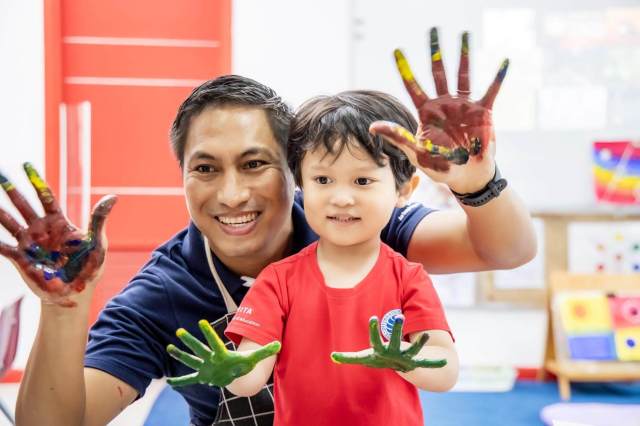
Cognitive development
By utilizing play activities, this teaching method provides an enjoyable and stimulating approach for children to acquire and develop a variety of skills. Through play-based learning, children are able to enhance their cognitive skills, including problem-solving, critical thinking, and creativity, while also fostering their social, emotional, and physical development. Play-based learning is an effective and dynamic approach to help children build a wide range of abilities and capabilities.
>>> Read more: How to prepare your child for an International Preschool?
Play-based learning is an educational approach that emphasizes the importance of play in children’s development. By engaging in play-based activities, children not only have fun, but they also develop a range of essential skills. For example, when children play dress-up, they learn about different roles and responsibilities, practice communication and negotiation skills. Similarly, playing with blocks can help children develop spatial awareness, problem-solving skills, and teamwork.
Play-based learning can also promote social skills, such as sharing and taking turns. For instance, when children play a board game together, they learn to take turns, follow rules, and accept losing graciously. This method can help children develop empathy and emotional intelligence. When children engage in dramatic play, such as pretending to be a doctor or a teacher, they learn to understand and express different emotions and perspectives.
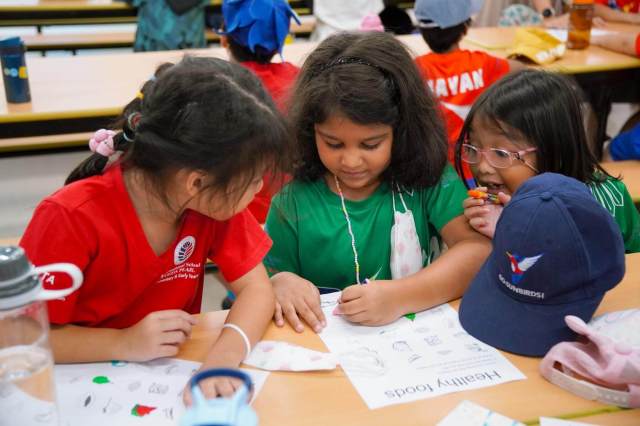
Emotional development
Play-based learning allows children to explore and express their emotions in a safe and supportive environment. Children can learn to identify and regulate emotions, develop empathy and social skills, and build resilience. Play-based learning can also help children develop a positive self-image and a sense of self-worth, contributing to their emotional well-being.
>>> Read more: How does personalized education at ISSP help students develop comprehensively?
Creative and imaginative
Play-based learning allows children to explore and experiment with different materials and ideas, which can stimulate their creativity and imagination. It also encourages children to use their imagination to create their own stories, games, and scenarios, which can help them develop their problem-solving and critical-thinking skills. It can also help children develop their social and emotional skills as they learn to work together, communicate, and express themselves in a safe and supportive environment. Play-based learning can be a powerful tool for fostering children’s creativity and imagination.
>>> Read more: Should parents let their children study at international preschools?
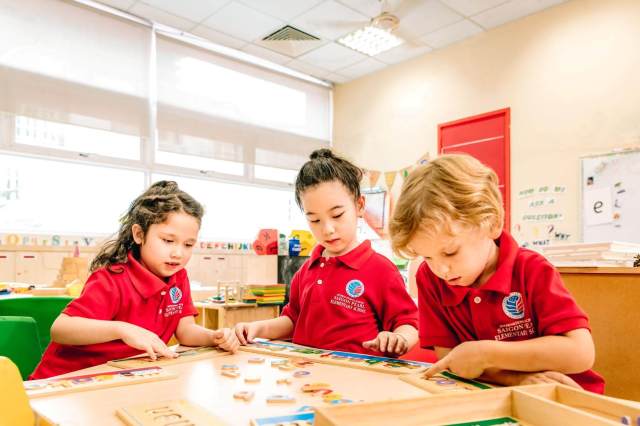
Positive attitude toward learning
Play-based learning is a fun and engaging way for children to learn new skills and concepts. It allows them to explore and experiment with different ideas and concepts in a safe and supportive environment. By incorporating play into their learning, children are more likely to be motivated and enthusiastic about learning, which can lead to a more positive attitude toward education. Moreover, play-based learning can help children develop important social and emotional skills, such as communication, problem-solving, and teamwork, which can further enhance their overall attitude toward learning.
>>> Read more: Skill development pathway of preschool students at International School Saigon Pearl
Physical development
Play-based learning provides opportunities for children to engage in physical activities such as running, jumping, climbing, and balancing, which can help develop their gross motor skills. It can also involve activities that promote fine motor skills, such as drawing, painting, and manipulating small objects. Play-based learning can also help children develop their hand-eye coordination, spatial awareness, and overall physical fitness. Therefore, incorporating play-based learning into a child’s daily routine can benefit their physical development.
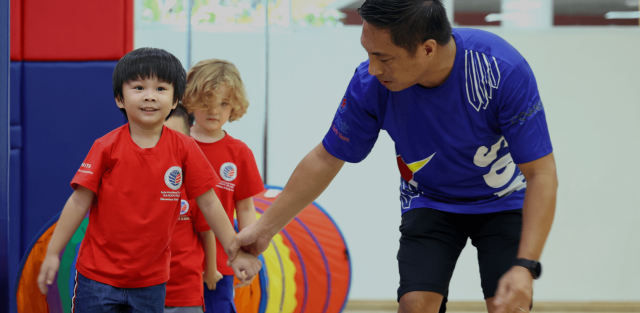
Students explore and experiment with different ideas. (Source: ISSP)
Play-based learning at International School Saigon Pearl
International School Saigon Pearl is the only monolingual international school in Binh Thanh District – Ho Chi Minh City for children from preschool to primary school. ISSP belongs to the Cognita education international group with over 85 members worldwide. ISSP is the only preschool and primary school in HCM city fully accredited by two prestigious educational accreditation organizations worldwide, the Council of International Schools (CIS) and the Association of Schools and Colleges New England (NEASC). Since 2023, ISSP has been officially authorized by the International Baccalaureate Organization (IBO) to offer the IB PYP curriculum, known for its high academic standards.
International School Saigon Pearl (ISSP) is a leading educational institution in Ho Chi Minh City that offers a play-based learning approach to its students. This approach is designed to provide children with a fun and engaging learning experience while also promoting cognitive, social, and emotional development.
At ISSP, play-based learning is integrated into all aspects of the curriculum, from early childhood education to primary education. The school’s facilities are designed to encourage exploration, creativity, and imagination, with dedicated play areas, outdoor spaces, and learning centers.
>>> Read more:
- Useful extracurriculum activities for students – The prominence of international primary schools
- Tuition Fee at International School Saigon Pearl

In the early years, children are encouraged to learn through play, with activities that promote sensory exploration, problem-solving, and social interaction. Teachers use a variety of materials and resources to create a stimulating learning environment, including blocks, puzzles, art materials, and sensory play items.
As children progress through primary education, play-based learning continues to be an essential part of the curriculum. Students are encouraged to take an active role in their learning, with opportunities to explore topics in-depth, collaborate with peers, and develop critical thinking skills.
One of the critical benefits of play-based learning at ISSP is that it promotes a love of learning. By making learning fun and engaging, students are more likely to be motivated and enthusiastic about their studies. This approach also helps to develop important life skills, such as creativity, problem-solving, and communication.
>>> Read more: The EAL program (English as an Additional Language) at International School Saigon Pearl (ISSP)
Overall, play-based learning is a core part of the educational philosophy at International School Saigon Pearl. By providing a stimulating and engaging learning environment, the school is helping to prepare students for success in the 21st century.
For more information, parents can contact the ISSP Admissions Office via:
- Phone number: +84 (028) 2222 7788.
- Email: admissions@issp.edu.vn.
- Facebook: ISSPVN
Through this article, ISSP hopes parents can understand that play-based learning is essential for children. Because it allows them to learn and develop skills in a fun and engaging way. Children can explore their environment, experiment with different materials, and interact with others through play. Additionally, play-based learning can help children develop physical skills like coordination, balance, and fine motor skills. This method is an effective way to support children’s development and prepares them for future learning and success.
